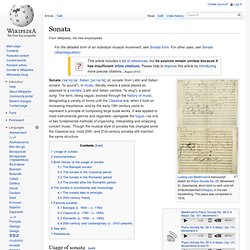

Mozart - Piano Sonata No. 11 in A major, K. 331 - I. Andante grazioso. Mozart Piano Sonata in C, K. 545 (1/2); 1st movement; Eschenbach. Beethoven - Moonlight Sonata (FULL) - Piano Sonata No. 14. Sonata. Sonata (/səˈnɑːtə/; Italian: [soˈnaːta], pl. sonate; from Latin and Italian: sonare, "to sound"), in music, literally means a piece played as opposed to a cantata (Latin and Italian cantare, "to sing"), a piece sung.

The term, being vague, evolved through the history of music, designating a variety of forms until the Classical era, when it took on increasing importance, and by the early 19th century came to represent a principle of composing large scale works. It was applied to most instrumental genres and regarded—alongside the fugue—as one of two fundamental methods of organizing, interpreting and analyzing concert music. Though the musical style of sonatas has changed since the Classical era, most 20th- and 21st-century sonatas still maintain the same structure. Usage of sonata[edit] Sonata (music.